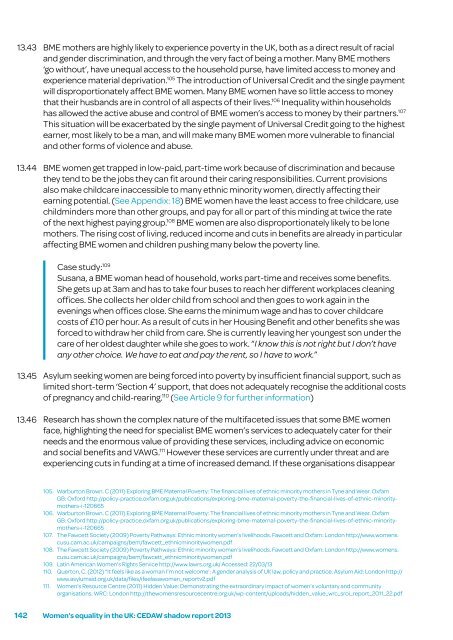Women’s equality in the UK – A health check
Women’s equality in the UK – A health check
Women’s equality in the UK – A health check
Create successful ePaper yourself
Turn your PDF publications into a flip-book with our unique Google optimized e-Paper software.
13.43<br />
13.44<br />
13.45<br />
13.46<br />
BME mo<strong>the</strong>rs are highly likely to experience poverty <strong>in</strong> <strong>the</strong> <strong>UK</strong>, both as a direct result of racial<br />
and gender discrim<strong>in</strong>ation, and through <strong>the</strong> very fact of be<strong>in</strong>g a mo<strong>the</strong>r. Many BME mo<strong>the</strong>rs<br />
‘go without’, have unequal access to <strong>the</strong> household purse, have limited access to money and<br />
experience material deprivation. 105 The <strong>in</strong>troduction of Universal Credit and <strong>the</strong> s<strong>in</strong>gle payment<br />
will disproportionately affect BME women. Many BME women have so little access to money<br />
that <strong>the</strong>ir husbands are <strong>in</strong> control of all aspects of <strong>the</strong>ir lives. 106 In<strong>equality</strong> with<strong>in</strong> households<br />
has allowed <strong>the</strong> active abuse and control of BME women’s access to money by <strong>the</strong>ir partners. 107<br />
This situation will be exacerbated by <strong>the</strong> s<strong>in</strong>gle payment of Universal Credit go<strong>in</strong>g to <strong>the</strong> highest<br />
earner, most likely to be a man, and will make many BME women more vulnerable to f<strong>in</strong>ancial<br />
and o<strong>the</strong>r forms of violence and abuse.<br />
BME women get trapped <strong>in</strong> low-paid, part-time work because of discrim<strong>in</strong>ation and because<br />
<strong>the</strong>y tend to be <strong>the</strong> jobs <strong>the</strong>y can fit around <strong>the</strong>ir car<strong>in</strong>g responsibilities. Current provisions<br />
also make childcare <strong>in</strong>accessible to many ethnic m<strong>in</strong>ority women, directly affect<strong>in</strong>g <strong>the</strong>ir<br />
earn<strong>in</strong>g potential. (See Appendix: 18) BME women have <strong>the</strong> least access to free childcare, use<br />
childm<strong>in</strong>ders more than o<strong>the</strong>r groups, and pay for all or part of this m<strong>in</strong>d<strong>in</strong>g at twice <strong>the</strong> rate<br />
of <strong>the</strong> next highest pay<strong>in</strong>g group. 108 BME women are also disproportionately likely to be lone<br />
mo<strong>the</strong>rs. The ris<strong>in</strong>g cost of liv<strong>in</strong>g, reduced <strong>in</strong>come and cuts <strong>in</strong> benefits are already <strong>in</strong> particular<br />
affect<strong>in</strong>g BME women and children push<strong>in</strong>g many below <strong>the</strong> poverty l<strong>in</strong>e.<br />
Case study: 109<br />
Susana, a BME woman head of household, works part-time and receives some benefits.<br />
She gets up at 3am and has to take four buses to reach her different workplaces clean<strong>in</strong>g<br />
offices. She collects her older child from school and <strong>the</strong>n goes to work aga<strong>in</strong> <strong>in</strong> <strong>the</strong><br />
even<strong>in</strong>gs when offices close. She earns <strong>the</strong> m<strong>in</strong>imum wage and has to cover childcare<br />
costs of £10 per hour. As a result of cuts <strong>in</strong> her Hous<strong>in</strong>g Benefit and o<strong>the</strong>r benefits she was<br />
forced to withdraw her child from care. She is currently leav<strong>in</strong>g her youngest son under <strong>the</strong><br />
care of her oldest daughter while she goes to work. “I know this is not right but I don’t have<br />
any o<strong>the</strong>r choice. We have to eat and pay <strong>the</strong> rent, so I have to work.”<br />
Asylum seek<strong>in</strong>g women are be<strong>in</strong>g forced <strong>in</strong>to poverty by <strong>in</strong>sufficient f<strong>in</strong>ancial support, such as<br />
limited short-term ‘Section 4’ support, that does not adequately recognise <strong>the</strong> additional costs<br />
of pregnancy and child-rear<strong>in</strong>g. 110 (See Article 9 for fur<strong>the</strong>r <strong>in</strong>formation)<br />
Research has shown <strong>the</strong> complex nature of <strong>the</strong> multifaceted issues that some BME women<br />
face, highlight<strong>in</strong>g <strong>the</strong> need for specialist BME women’s services to adequately cater for <strong>the</strong>ir<br />
needs and <strong>the</strong> enormous value of provid<strong>in</strong>g <strong>the</strong>se services, <strong>in</strong>clud<strong>in</strong>g advice on economic<br />
and social benefits and VAWG. 111 However <strong>the</strong>se services are currently under threat and are<br />
experienc<strong>in</strong>g cuts <strong>in</strong> fund<strong>in</strong>g at a time of <strong>in</strong>creased demand. If <strong>the</strong>se organisations disappear<br />
105. Warburton Brown. C (2011) Explor<strong>in</strong>g BME Maternal Poverty: The f<strong>in</strong>ancial lives of ethnic m<strong>in</strong>ority mo<strong>the</strong>rs <strong>in</strong> Tyne and Wear. Oxfam<br />
GB: Oxford http://policy-practice.oxfam.org.uk/publications/explor<strong>in</strong>g-bme-maternal-poverty-<strong>the</strong>-f<strong>in</strong>ancial-lives-of-ethnic-m<strong>in</strong>oritymo<strong>the</strong>rs-i-120665<br />
106. Warburton Brown. C (2011) Explor<strong>in</strong>g BME Maternal Poverty: The f<strong>in</strong>ancial lives of ethnic m<strong>in</strong>ority mo<strong>the</strong>rs <strong>in</strong> Tyne and Wear. Oxfam<br />
GB: Oxford http://policy-practice.oxfam.org.uk/publications/explor<strong>in</strong>g-bme-maternal-poverty-<strong>the</strong>-f<strong>in</strong>ancial-lives-of-ethnic-m<strong>in</strong>oritymo<strong>the</strong>rs-i-120665<br />
107. The Fawcett Society (2009) Poverty Pathways: Ethnic m<strong>in</strong>ority women’s livelihoods. Fawcett and Oxfam: London http://www.womens.<br />
cusu.cam.ac.uk/campaigns/bem/fawcett_ethnicm<strong>in</strong>oritywomen.pdf<br />
108. The Fawcett Society (2009) Poverty Pathways: Ethnic m<strong>in</strong>ority women’s livelihoods. Fawcett and Oxfam: London http://www.womens.<br />
cusu.cam.ac.uk/campaigns/bem/fawcett_ethnicm<strong>in</strong>oritywomen.pdf<br />
109. Lat<strong>in</strong> American <strong>Women’s</strong> Rights Service http://www.lawrs.org.uk/ Accessed: 22/03/13<br />
110. Querton, C. (2012) “It feels like as a woman I’m not welcome’: A gender analysis of <strong>UK</strong> law, policy and practice. Asylum Aid: London http://<br />
www.asylumaid.org.uk/data/files/ifeelasawoman_reportv2.pdf<br />
111. <strong>Women’s</strong> Resource Centre (2011) Hidden Value: Demonstrat<strong>in</strong>g <strong>the</strong> extraord<strong>in</strong>ary impact of women’s voluntary and community<br />
organisations. WRC: London http://<strong>the</strong>womensresourcecentre.org.uk/wp-content/uploads/hidden_value_wrc_sroi_report_2011_22.pdf<br />
142 <strong>Women’s</strong> <strong>equality</strong> <strong>in</strong> <strong>the</strong> <strong>UK</strong>: CEDAW shadow report 2013


